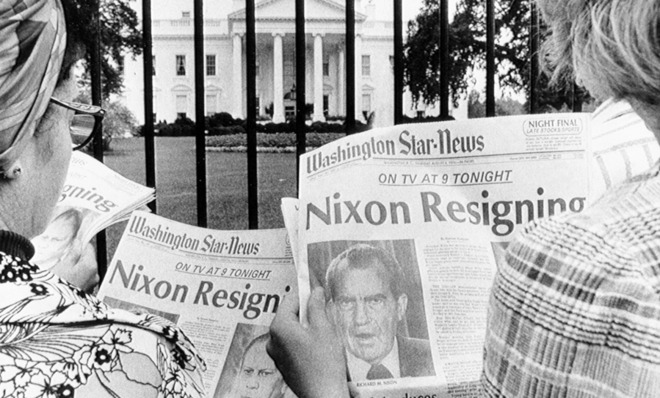Why journalists deserve special protections


A free daily email with the biggest news stories of the day – and the best features from TheWeek.com
You are now subscribed
Your newsletter sign-up was successful
Geoffrey Stone, a University of Chicago law professor, friend to the president, and member of his intelligence policy review committee, writes in The Daily Beast today that Congress should enshrine some sort of special protection into law for the reporter-source relationship. It is an essential element of democracy, he says. And we tend to protect essential instruments, particularly those (like the lawyer-client relationship and marriage) which reflect and strengthen fundamental values.
The press professionalized in the early 19th century, fighting against consolidated corporate power and consciously assuming the role of watchdogging the expanding government. It never truly de-partisanized, but by the middle of the century, journalism was a thing unto itself, an occupation that did not necessarily imply any particular affiliation with a political party. Journalists had biases, to be sure. But those biases were functional and precisely the reason why journalism because such a change agent. The "fifth column" was predisposed to speak up for those who couldn't otherwise participate in democracy. It brought a wordily conscience to civil rights. It held powerful interests accountable to the basic creed of American democracy, a creed holding that basic rights cannot be infringed arbitrarily or for the personal gain of someone else, a creed that maximized rights to speech, assembly, and political participation.
When it comes to war and rumors of war, press leaks have become powerful and direct catalysts in favor of political change. Presidents hate them.
The Week
Escape your echo chamber. Get the facts behind the news, plus analysis from multiple perspectives.

Sign up for The Week's Free Newsletters
From our morning news briefing to a weekly Good News Newsletter, get the best of The Week delivered directly to your inbox.
From our morning news briefing to a weekly Good News Newsletter, get the best of The Week delivered directly to your inbox.
Confidential source-reporter relationships were primarily responsible for --
(a) the Church Committee's reforms to the intelligence community — think of Seymour Hersh's reporting on the Family Jewels and the National Security Agency.
(b) The hastening of the end of the disastrous Vietnam War — Daniel Ellsberg and The New York Times, as well as Jack Anderson's columns about Nixon's expansion of bombing campaigns.
(c) exposing Watergate.
A free daily email with the biggest news stories of the day – and the best features from TheWeek.com
(d) exposing the Iran Contra Affair (newspapers began to report on the arms-for-hostages trading in 1986).
(e) the CIA's GREYSTONE rendition, interrogation, and detention program after 9/11.
(f) the NSA's post-9/11 domestic surveillance.
And for much, much more.
Stone does not gloss over the difficulties inherent in giving legal status to any new privilege. Who, precisely, is a journalist? What are the formal and informal rules that judges will use to decide whether the subject of the interaction between source and journalist is indeed within the public's interest? Won't people try to game the system for their own parochial ends?
He notes, though, that the debates about every privilege and protection we already enjoy, including our basic freedom to speak, are dynamic and enduring. That's no reason to avoid recognizing them in the first place.
Marc Ambinder is TheWeek.com's editor-at-large. He is the author, with D.B. Grady, of The Command and Deep State: Inside the Government Secrecy Industry. Marc is also a contributing editor for The Atlantic and GQ. Formerly, he served as White House correspondent for National Journal, chief political consultant for CBS News, and politics editor at The Atlantic. Marc is a 2001 graduate of Harvard. He is married to Michael Park, a corporate strategy consultant, and lives in Los Angeles.
-
 ‘Poor time management isn’t just an inconvenience’
‘Poor time management isn’t just an inconvenience’Instant Opinion Opinion, comment and editorials of the day
-
 Bad Bunny’s Super Bowl: A win for unity
Bad Bunny’s Super Bowl: A win for unityFeature The global superstar's halftime show was a celebration for everyone to enjoy
-
 Book reviews: ‘Bonfire of the Murdochs’ and ‘The Typewriter and the Guillotine’
Book reviews: ‘Bonfire of the Murdochs’ and ‘The Typewriter and the Guillotine’Feature New insights into the Murdoch family’s turmoil and a renowned journalist’s time in pre-World War II Paris
-
 Why Puerto Rico is starving
Why Puerto Rico is starvingThe Explainer Thanks to poor policy design, congressional dithering, and a hostile White House, hundreds of thousands of the most vulnerable Puerto Ricans are about to go hungry
-
 Why on Earth does the Olympics still refer to hundreds of athletes as 'ladies'?
Why on Earth does the Olympics still refer to hundreds of athletes as 'ladies'?The Explainer Stop it. Just stop.
-
 How to ride out the apocalypse in a big city
How to ride out the apocalypse in a big cityThe Explainer So you live in a city and don't want to die a fiery death ...
-
 Puerto Rico, lost in limbo
Puerto Rico, lost in limboThe Explainer Puerto Ricans are Americans, but have a vague legal status that will impair the island's recovery
-
 American barbarism
American barbarismThe Explainer What the Las Vegas massacre reveals about the veneer of our civilization
-
 Welfare's customer service problem
Welfare's customer service problemThe Explainer Its intentionally mean bureaucracy is crushing poor Americans
-
 Nothing about 'blood and soil' is American
Nothing about 'blood and soil' is AmericanThe Explainer Here's what the vile neo-Nazi slogan really means
-
 Don't let cell phones ruin America's national parks
Don't let cell phones ruin America's national parksThe Explainer As John Muir wrote, "Only by going alone in silence ... can one truly get into the heart of the wilderness"
